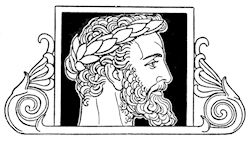Titre
Aristaeneti Epistolae graecae cum versione latina et notis Josiae Merceri curante Joan. Cornelio de Pauw, cujus notae accedunt.
Auteur
ARISTAENETUS.
Éditeur
Utrecht (Trajecti ad Rhenum), Apud Hermannum Besseling, 1737.
Prix
€ 225,00(Excl. toute livraison)
Plus d'informations

Antiquariaat Fragmenta Selecta heeft de Klassieke Oudheid als specialisatie. Boeken op het gebied van de Klassieke talen, Oude Geschiedenis, Patrologie, Middeleeuws Latijn en Neolatijn.
Nieuwe klanten leveren we na vooruitbetaling. U ontvangt per email een opgave van de portokosten en de betaalmogelijkheden. Betaalwijzen: Bank, PayPal, Visa/Mastercard.
Elk boek kan binnen 14 dagen na ontvangst teruggezonden worden, in dezelfde staat als waarin het werd verstuurd en op dezelfde manier verpakt en verzonden. Retourzendingen dienen voldoende gefrankeerd te zijn.
English: Pre-payment is necessary for new customers. Our order confirmation will provide detailed information and a specification of the shipping costs. Payment is possible by Bank Transfer, Paypal and Visa/Mastercard.
Books may be returned within 14 days of receipt, if returned in the same condition as sent, and packed, shipped and insured as received.
- Tous les livres sont en état complet et normal, sauf indication contraire. De petites imperfections comme une page collée ou un nom sur la feuille ne sont pas toujours mentionnés
- Vous gérez directement cette commande avec Fragmenta Selecta
- Après votre commande vous et Fragmenta Selecta recevrez une confirmation par e-mail. Dans l'e-mail que vous pouvez trouver, vous pouvez trouver le nom et l'adresse de Fragmenta Selecta
- L'acheteur paie les frais de livraison, sauf accord contraire
- Fragmenta Selecta peut demander un prépaiement
- Boekwinkeltjes.nl essaie de rapprocher les acheteurs et les vendeurs. Boekwinkeltjes.nl n'est jamais impliqué dans un accord entre l'acheteur et le vendeur. Si vous avez un différend avec un ou plusieurs utilisateurs, vous devez le réparer vous-même. Vous indemnisez Boekwinkeltjes.nl de toute réclamation.
